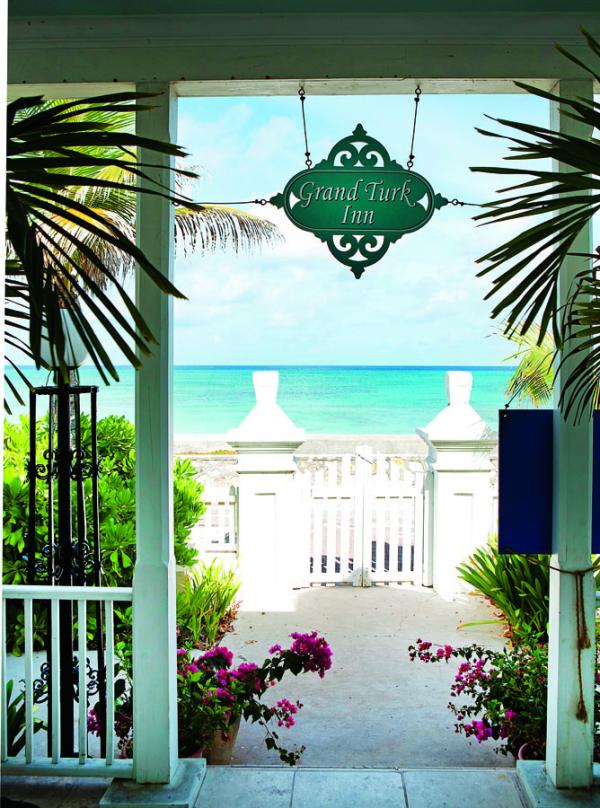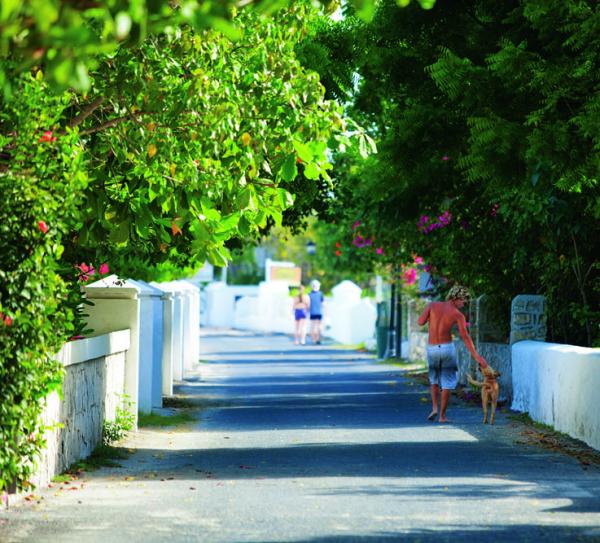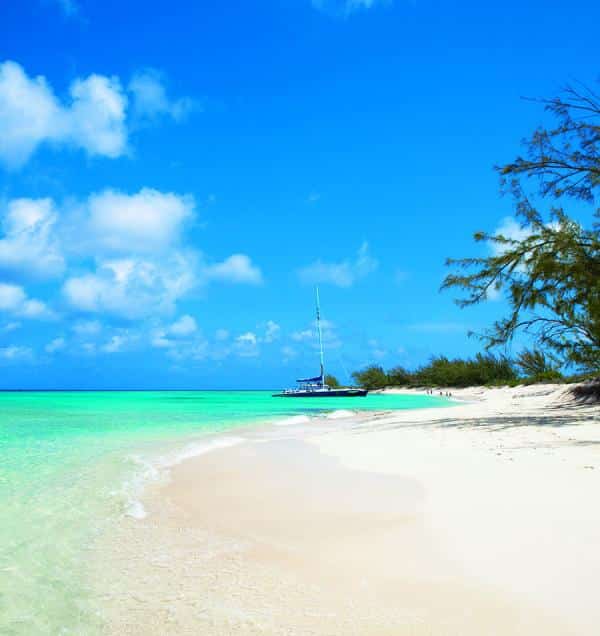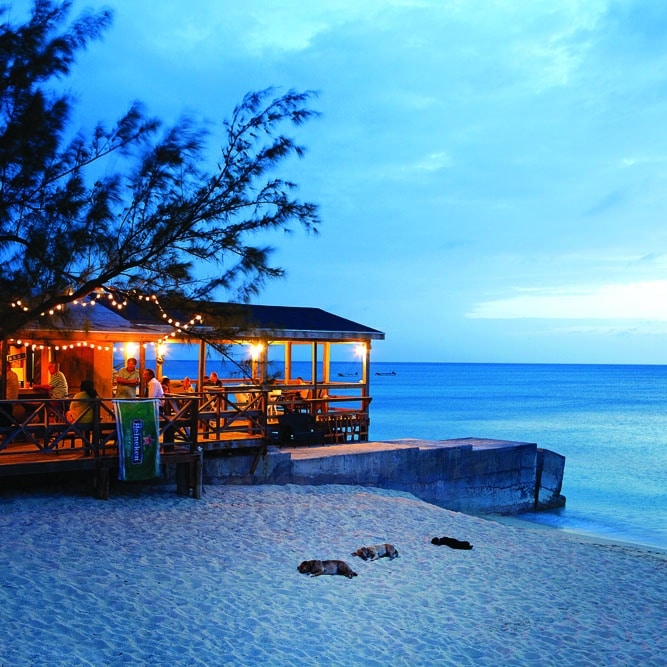The Carefree Island
I flew across a continent, ate breakfast at a barbecue stand in an airport and was on the move nonstop for 24 hours. All to visit a place where nothing moves at all. Why? Because I'm told it may save me. Stress is my enemy. A serious one. My heart stopped beating properly years ago, and my guts gave up a few years before that. I have a medical file that needs its own server, and although there are days where I win, there are others where things that shouldn't be happening to a 48-year-old win. Grand Turk is supposed to change all that.
Vacation time is squeezed, rare as a sighting of an ivory-billed woodpecker. We can't afford to waste a single moment of it, even when the whole point of a vacation is to waste every single moment of it — soaking in a pretty pool, savoring a weird fruit dessert.
And all that's exactly why I've come to Grand Turk, the not just sleepy but positively narcoleptic capital of Turks and Caicos. Where even the local tourist board told me there was nothing to do. An island seven miles long, one mile wide and such a bundle of energy that for hundreds of years its main industry involved waiting for water to evaporate.
The idea is, I am going to sit very still on this island and do absolutely nothing. I'm going to completely relax, scribble notes from a deck chair and absorb the view of sooty terns offering the only shade over the calm, calm ocean. I'm going to see what that does to me, and yes, to my health. It sounds so easy.

So why am I about to jump up from this beach, where I've been smelling flowers with scents as complex as cinnamon toast, fresh laundry and the way perfume lingers after a kiss? Why am I about to stop listening to the complicated rhythm of swells hitting the sand, coral ground like diamond dust, synchronizing my faulty heartbeat with the pulse of the world? And why am I still dog-earing pages in guidebooks that cover this place, feeling as hyper as somebody who fills his Pez dispenser with NoDoz?
Because when I travel, each time I stop to linger for even a moment, I hear my father's bellowing voice: "You're burning daylight!" Because he taught me the world is rare and not to be squandered.
Besides, I should know where I'm relaxing, right? Get a little context? So it won't matter if I get out of this chair and head out, walking the narrow main street, lined on both sides with low, whitewashed walls and colonial houses that bring to mind the term "gone tropo" — all porches and verandas and high ceilings desperate to coax in the breeze. Perhaps learn a little from those dogs lazing the day away in the shade of trees, only occasionally looking up at the beach.
Of course, while I'm out, I should probably grab a taxi and check out the north end of the island to see the lighthouse, because there's a half-sunken boat on the reef that offers proof of what happens if you don't see the lighthouse. And then there's still time to book a trip on a non-sunken boat to see stingrays, time maybe to run into the museum, and to finish the day off trying to find out why the cruise-ship terminal tore out all the local plants and planted palm trees instead, as if this tropical island wasn't quite tropical enough for the brochure.
But that's not what I've come to do. All I've come here to do is sit very still and do absolutely nothing. Feel my blood pressure drop. Find the trick behind pure relaxation. Find the cure for everything that ails me by sinking so slowly into the glittering sand that even gravity won't have the ambition to touch me.
At least, that's what I'll do tomorrow.
Despite all historic evidence saying no way, the plaque behind me says this beach was Columbus' very first landfall in the Americas after sailing the ocean blue.

"Really? Columbus?" I ask a dozen locals. "Well, no. Not really." About 20 years ago newspapers declared the Niña —Columbus' lost ship — had been found in a few fathoms of water nearby. Turns out that was a big "not really" too, but the ship is the oldest European wreck in the Americas, dating to 1513. Relics from it fill the Grand Turk museum: cannons, anchors, tools. "No sign anyone died," the curator says. "No shoe buckles."
I'm hoping my eventual epitaph isn't "he left shoe buckles," but there's really no chance of that right now, because those long-ago sailors were likely the last people to wear shoes on Grand Turk, as they waded ashore and no doubt did what visitors have done ever since: looked for rum punch.
I find mine at the Sand Bar. "You come here," says Tonya, the bar's co-owner, "it's instantly One Love. Honest and genuine."
She doesn't let me pay for my first rum punch. Which means I will buy a lot more of them to thank her. The bar is shady, pure relief on an island that's perfected the art of evaporation.
Grand Turk was once one of the world's premier salt producers. The drying ponds, abandoned about 50 years ago, still dominate the island. "What you need for salt," says Sherlin Williams, former head of the local preservation society, "is sun and wind." Which is pretty much what you need for a beach vacation too. I'd point that out, but he's on a roll — explaining how it can take up to three months to make salt, time spent doing little but watching the speed at which the water disappears. But it occurs to me what you're really doing is paying exceptionally close attention to the world's rhythm and the effect of weather on the planet's skin.
That's what I'm supposed to be doing, so after I learn about salt, I do not move farther than it takes to get the rum punch from the table to my mouth. As the wind and sun bake every bit of salt out of me, I watch daylight sink behind clouds, the moon appearing amid constellations I will never learn the names of.

I could look them up, or I could sit here a while longer and continue to bask in the wisdom of a guy named Salt Cay, so well known locally that his real name is a reference to where he's from: "Why wouldn't I be happy?" he tells me. "I'm laid-back."
That man could have saved me millions in medical bills over the past few years, if only I'd met him in time.
So also could a duho, a chair made 1,000 years ago by the Lucayan people who then called this island home. The museum sign said it was a ceremonial chair. It looked to me like a La-Z-Boy in full recline, made for lying back watching other people run around and sweat while pretending to enjoy themselves. Exactly the ceremony I've come here for.
That ceremony is making Dad's voice come back in my head. "You're burning daylight," he screams. And I whisper back, "Yeah, and I'm starting to like it."
"It all comes down to the Illuminati, mon," says the car radio as I walk past, looking for a new beach. I've made a deal with myself: I'll move about, but only from one beach to the next. It gives me the illusion of progress without really changing my view, considering how small the island is.
This illusion of progress has awoken me to far bigger problems. Namely, that we live in an era that has confused distraction with relaxation, and we're so sold on the idea that busy equals fulfilling that even what we do for relaxing isn't actually relaxing, but is more an attempt to keep busy enough to forget that we're not relaxing. And like good junkies everywhere, we need a bigger fix of our drug — the pretense of action — to get the same high.

How else to explain an era in which we look at two different screens while carrying on a conversation and eating food that appeared in less time than it takes this fisherman on the beach to reel in his line? Maybe it's all a grand Illuminati conspiracy to disprove every seeker who says the truth lies within. Let's face it, the modern world isn't much about truth. At least, not when shiny things are around to distract from it.
But if you ignore the island's cruise-ship terminal — as pretty much everybody in town does — Grand Turk offers no shiny things. I have trouble even finding a postcard to send back home.
So I decide to have another rum punch. Around me, patrons offer reminders of how incredibly nice people who are relaxed can be. "When you're here," says Andrew Foster, who spends time every year on Grand Turk, "it's like your body is dumping toxins."
Each time I think about doing something, each time I feel the reflex for distraction — run to my room to check e-mail, revisit the museum to reread how John Glenn splashed down here after orbiting the Earth — I take a sip and go back to synching my heartbeat with the slow lap of water on this beach.
As daylight once again turns into nighttime, a second rhythm rises to join the waves as a local rake and scrape band starts to play. The music gets its name from the man playing a carpenter's saw. Why look for an instrument when you can just adapt what's already there? Why look for distraction when the whole world is right here, in the opening notes of the band playing yet another song about love and loss and longing and that beautiful Grand Turk hopefulness that nothing is ever truly missing?
I might be missing a ton of stuff. Probably am. But that's OK because I'm not missing any of this right here: the way the music echoes the sea's own backbeat, the off-rhythm squawk of a pelican in an old salt pond, the slow wag of a wet dog's tail.
Maybe there's no historic proof to show that Columbus was ever anywhere near Grand Turk. But I bet he was just so relaxed when he visited here he didn't bother to write it down in the logbook. Maybe he lived it instead of worrying about remembering it. I'm starting to feel really, really good. I'm going to put my pen down now.
